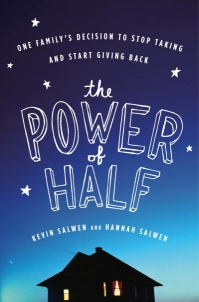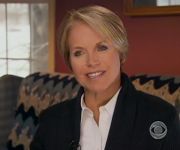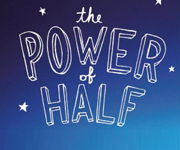I received a free review copy of The Power of Half, but it ended up costing me $50. Fifty bucks that won’t go toward a much-needed (fine, much-wanted) pedicure, about a dozen cinnamon lattes, a month of cable or my cell phone, or a couple of weeks worth of bus fare for my ride to and from work.
 The just-released book, written by former Wall Street Journal reporter and editor Kevin Salwen and his 17-year-old daughter Hannah Salwen (check out Ask Umbra’s Change Agent interview with Hannah), details the Atlanta family’s decision to jump off of the bigger, better, faster, stronger treadmill, sell their 6,500-square-foot home, and move into one half the size (at $800,000 — still pretty nice digs).
The just-released book, written by former Wall Street Journal reporter and editor Kevin Salwen and his 17-year-old daughter Hannah Salwen (check out Ask Umbra’s Change Agent interview with Hannah), details the Atlanta family’s decision to jump off of the bigger, better, faster, stronger treadmill, sell their 6,500-square-foot home, and move into one half the size (at $800,000 — still pretty nice digs).
Spurred by then-14-year-old Hannah’s reaction to sitting at an intersection in Atlanta next to a homeless man and a fellow driving a Mercedes, the Salwens pledged half their original home’s sale value to The Hunger Project.
I was in the middle of the book two days ago when I suddenly put it down and turned to my husband, Brian.
“Hey, remember that hundred you found? We should give away half of it,” I said.
OK, timeout. Yes, Brian found a $100 on the sidewalk early one morning a few weeks ago. Some would say, “Give away the whole thing. It’s found money. No loss to you.” Well, some people would also have already spent the $100 immediately on something super-fun and frivolous (see pedicure and lattes above) because, hey, it’s found money. Similarly, some would say, and have said, about the Salwens’ situation, “Big freaking deal. You sold a really big mansion to move into a smaller mansion.” Following media appearances by the Salwen clan, people have also taken to the anonymity of the Internet to criticize the family’s decisions about how much they donated, to which organization they donated, and in which country the funds were to be spent. (One even called Hannah a “fucking spoiled whore who knows nothing” — you kiss your mother with that mouth, buddy?) But here’s the thing: They. Did. Something. And half of something they had in excess was a quantifiable way for them to do it.
Admittedly, I entered into the book somewhat skeptical — for all the reasons web commenters and the Salwens’ own friends were. Affluent family donates money, so what? An idealistic teenager wants to solve the world’s problems? Uh-huh, been there. But the grounded, genuine nature of this family — teenaged Hannah and Joseph, mom Joan, and dad Kevin, who all had an equal say in the donation process — along with a compelling and well-written narrative left me both impressed and inspired. Kevin and Hannah note many an inspirational quote from history’s great men and women like Martin Luther King, Jr., Rosa Parks, and Roman philosopher Cicero to help weave their tale, which I found largely unnecessary (this family would definitely clean up in Jeopardy‘s “Quotable Quotes” category), though, as a quotes collector myself, I understand how one can fall in love with another’s powerful words to the point that it would seem like a glaring oversight to omit them. Overall, the book was endearing, funny, and uplifting — perhaps a bitter pill for cynics to swallow but a really nice change of pace from the gloom and doom that often surrounds us.
So back to my $50. In an impetuous fervor before finishing the book, I was desperate to do something at that moment, to make a difference in someone’s life. I clicked the “donate now” button on NothingButNets.net, which uses 100 percent of donations to provide anti-malaria bed nets to children in Africa. Right afterward, as I continued to read the book I began to question myself, wondering if I had truly empowered the people to whom my money would be donated or if I was simply providing temporary relief. Regardless, I felt good about my decision to give something, though I didn’t have the focus that it took the Salwens more than a year to find. And it left me feeling not only hopeful but motivated — which is key, because, as the Salwens show us, hope without action is empty.



